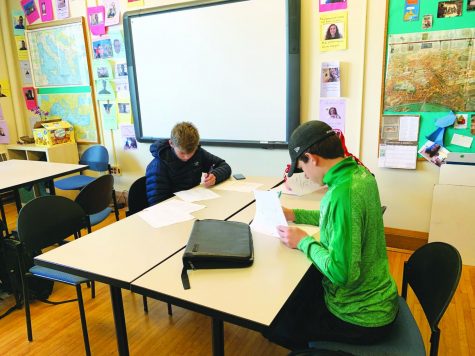Students Seek Clarifying Communication of Definition, Consequences
November 8, 2019
On paper, academic honesty has a similar definition for most students. Amaka Nwokocha ’21 describes the definition of academic honesty as “[j]ust not cheating. Doing your own work.” But, while the meaning of academic honesty seems simple, there is abundant confusion and issues between students and teachers about what this truly includes.

Amelia Reyes ’21 states, “for example, some teachers think that the learning process is talking with other people […] Other teachers will say that you can’t even talk with other people. I think the inconsistencies are problematic because some kid could get easily confused or mess up since different teachers have different expectations.” Many students find the academic dishonesty policies ambiguous since teachers have different expectations in spite of the singular set of rules listed in the student handbook. These rules are discussed in classes and homeroom for a brief period of time at the start of each school year.
Additionally, while the school tries to enforce academic honesty, students believe that cheating is a very prevalent problem that creates animosity within the student body. An anonymous source states, “it’s kinda annoying cause [the people who cheat] don’t do anything, and then they get good grades.” Although the school has countless measures to punish academic honesty, they have a difficult time catching the students that are cheating intentionally or unintentionally. Another anonymous source states, “I think [cheating] is extremely common…but I don’t tell other peoples’ business.”
While many teachers have different definitions of academic honesty, the entire student body is required to sign a document at the beginning of the year pledging academic honesty and integrity. Nwokocha states, “I think it’s problematic that we have to sign one document at the beginning of the year because teachers donít necessarily agree with it. At the beginning of the course, say what the policies are.”
When students are forced to sign one document that all teachers don’t completely agree with or miss details, it can cause sticky situations that can end up going to the Community Judiciary Board for discussion and punishment. CJB member Sam Deignan ‘20 says, “most cases of academic dishonesty, are based on miscommunication. […] [M]ost things I’ve seen are kids who don’t understand. It’s tough because they don’t see or they don’t know why they have made a mistake because most of it is a lack of communication or miscommunication.”
But amid this confusion is, as Deignan explains, the genuine desire to learn, making unclear guidelines stressful for students just trying to follow the rules. He explains that above all, “the kids here, they mean well in what they are doing.”